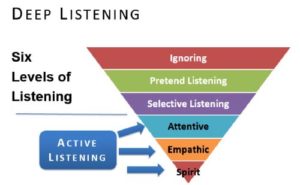What are you listening to right now?
Music, a clock, traffic, people talking, wind, a dog barking, a baby crying, the TV, etc.
How many sounds can you identify all around you right now?
One of our challenges as leaders is to know what sounds to let fall into the background and which ones we need to focus on because they are important. Too often we focus on the wrong sounds and miss the right ones.
“Most people do not listen with the intent to understand; they listen with the intent to reply. They are either speaking or preparing to speak.” – Stephen R. Covey
Over the years I have worked with and for some great leaders. One of the skills that I feel takes a leader to the next level is their ability to actively listen to others. How about you? On a scale of one to ten, with ten being the best, where would you rank your listening skills?
 One of the core competencies of all types of coaching is Deep Listening. This is a key area when I teach either basic coaching classes or discipleship coaching seminars. We intentionally spend extra time on this area because I know it is a challenge for many of us and is an area we can all improve.
One of the core competencies of all types of coaching is Deep Listening. This is a key area when I teach either basic coaching classes or discipleship coaching seminars. We intentionally spend extra time on this area because I know it is a challenge for many of us and is an area we can all improve.
I believe there are six levels of listening:
- Ignoring – another person is talking, maybe directly to us, and we are not paying any attention to them at all. Our minds are occupied somewhere else.
- Pretend Listening – someone is talking to us and we are nodding our head and saying “uh huh” just enough to make them think we are paying attention (while we look at our phone).
- Selective Listening – we hear a few words or phrases, but not enough to catch the whole meaning. This often causes us to ask someone to repeat what they just said.
- Attentive – we hear every word and understand the meaning being communicated to us.
- Empathic – not only do we hear every word and understand the meaning, we also “get” how what is being communicated to us is making the other person feel.
- Spirit – for Christians, this is where we hear the Holy Spirit communicating to us through what the other person is saying. We hear their words, understand how they feel, and have a clear sense of God’s Spirit within the other person.
Even the very best listeners can find it challenging to stay in the “active listening” area all the time. Like any skill, it takes practice and intentionality.
Here are a few best practices to help you improve your listening skills:
- Make eye contact with a person talking to you. Do not let yourself be distracted by things going on around you.
- Learn to quite your mind chatter so you can be fully present during a conversation.
- The words “listen” and “silent” have the same letters. Practice being silent a few minutes a day. Become comfortable with small amounts of silence in conversations.
- Watch a TV show or movie with the sound turned off for a while. Notice body language and non-verbal clues.
- Watch the TED Talk of Julian Treasure, 5 ways to listen better.
- Resist the urge to share a story or brilliant comment during important conversations with others.
- Stop trying to multi-task when you should be listening.
- Listen to understand, not fix the other person.
Most people cannot remember the last time someone really listened to them. How sad. As leaders we are called to model the way. Make it a point today to improve your listening skills.
Listening is a tremendous gift. Give that gift to someone today!